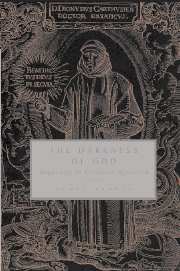Book contents
- Frontmatter
- Contents
- Acknowledgements
- Introduction
- PART ONE TWO SOURCES AND A SYNTHESIS
- 1 The Allegory and Exodus
- 2 Cataphatic and the apophatic in Denys the Areopagite
- 3 The God within: Augustine's Confessions
- 4 Interiority and ascent: Augustine's De Trinitate
- 5 Hierarchy interiorised: Bonaventure's Itinerarium Mentis in Deum
- PART TWO DEVELOPMENTS
- Further reading
- Index
2 - Cataphatic and the apophatic in Denys the Areopagite
Published online by Cambridge University Press: 23 November 2009
- Frontmatter
- Contents
- Acknowledgements
- Introduction
- PART ONE TWO SOURCES AND A SYNTHESIS
- 1 The Allegory and Exodus
- 2 Cataphatic and the apophatic in Denys the Areopagite
- 3 The God within: Augustine's Confessions
- 4 Interiority and ascent: Augustine's De Trinitate
- 5 Hierarchy interiorised: Bonaventure's Itinerarium Mentis in Deum
- PART TWO DEVELOPMENTS
- Further reading
- Index
Summary
At the outset of our enquiry we need an explanation, if only of the most general sort, of two technical terms belonging to the vocabulary of late Platonist Christian theology, for without them the explanation of the purposes of this chapter is impossible. Those terms are ‘apophaticism’ and its complementary partner, ‘cataphaticism’. They have a technical sense, and it is a principal purpose of this essay to clarify that sense, or those senses, which they acquire within the Latin traditions of Neoplatonic mysticism, but for the immediate purpose of getting that discussion going, they can be given an accessibly non-technical explanation. ‘Apophaticism’ is the name of that theology which is done against the background of human ignorance of the nature of God. It is the doing of theology in the light of the statement of Thomas Aquinas in the thirteenth century, that ‘we do not know what kind of being God is’. It is the conception of theology not as a naive pre-critical ignorance of God, but as a kind of acquired ignorance, a docta ignorantia as Nicholas of Cues called it in the fifteenth century. It is the conception of theology as a strategy and practice of unknowing, as the fourteenth-century English mystic called it, who, we might say, invented the transitive verb-form ‘to unknow’ in order to describe theological knowledge, in this its deconstructive mode. Finally, ‘apophaticism’ is the same as what the Latin tradition of Christianity called the via negativa, ‘the negative way’. These are among the things which are meant by the term ‘apophaticism’.
- Type
- Chapter
- Information
- The Darkness of GodNegativity in Christian Mysticism, pp. 19 - 49Publisher: Cambridge University PressPrint publication year: 1995
- 1
- Cited by



